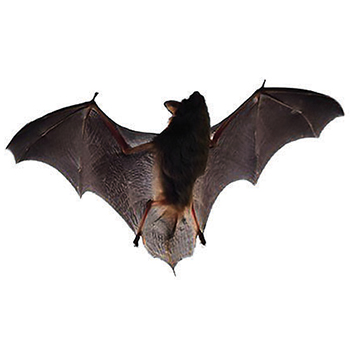Pennsylvania Bat Control

If unwanted bats are roosting in your Pennsylvania home or business, removing them can be complicated without the help of wildlife control professionals. In Pennsylvania, these insect-eating species are highly beneficial to the environment. Some species are even endangered, and so it’s easy to see why both state and federal regulations protect them; however, bats can also be carriers of disease and as such, can be a liability to people if they’re living in the same spaces. To protect your Pennsylvania home or business from bats, you need to learn about the behavior of this pest, take steps for prevention, and find effective treatment options should an infestation occur.
Understanding the Habits of Bat Species in Pennsylvania
Pennsylvania is home to nine different species of bats. Wildlife control experts at Viking Pest explain bats can be found locally from spring to fall. However, three species migrate south during the winter, while year-round species hibernate. All Pennsylvania-based bat species are of the Vespertilionidae family and obtain all of their nutrition from insects. Bats need a huge amount of food each day to keep up their energy and eat up to 25% of their body weight with each feeding.
Wildlife control experts at Viking Pest explain the species of bat that can be found in Pennsylvania include:
- Little brown bat
- Red bat
- Small-footed bat
- Silver-haired bat
- Tri-colored bat
- Big brown bat
- Hoary bat
- Northern long-eared bat
- Indiana bat
The most common species that will be found in and around homes and businesses are the little brown bat and the big brown bat. Although bats originally utilized hollow trees and foliage as a primary roosting place when raising their young, rapid development and loss of habitat in Pennsylvania caused them to adapt differently. Today, maternity colonies during the spring and early summer are found in sheds, attics, and other buildings. They may even hibernate overwinter in these same spaces if other habitats are scarce.
Preventing Bats in Your Pennsylvania Home or Business
The utmost care should be taken if you have bats in your Pennsylvania home or business. Although healthy bats are never aggressive towards humans, they can accidentally enter buildings where humans are and once there, they could panic. While it’s estimated that only about 1% (or less) of the wild bat population has rabies, this disease is easily transmitted through bites and can be fatal if it goes untreated. It’s essential that no bats are in a building where humans sleep or children can be vulnerable to bites.
Effectively bat-proofing your Pennsylvania home or business is the best method to prevent bats from becoming a problem. This is best done by an experienced professional who can evaluate your property’s weak points and initiate preventive protocol. This may include:
- Sealing potential entrances, which may include cracks or crevices in the roof or siding of the building, along with vents or utility passages.
- Installing one-way doors that allow bats to exit a building, but not return. This way, as they exit at night to feed, they vacate the premises and are effectively barred from re-entering.
Pennsylvania Conservation Laws and Regulations for Bat Populations
Since bats are essential to the ecological balance of the region, the state of Pennsylvania has regulations in place which protect these creatures. As non-game animals, bats are protected by Pennsylvania law when flying and hibernating. However, when bats are present in homes or businesses, control methods are left to the discretion of the building owner. Even so, no poisons or toxic chemicals should be used to eliminate a problem with bats, as this can cause a health risk to a wider population.
Additionally, it’s important to know that even one-way doors, which are generally an extremely humane way to remove bats from buildings, are prohibited during certain seasons. If a building owner installs one-way doors in a building where a maternal colony resides, the female bats will vacate the building in the evening, and be unable to return to their nursing young at the end of the night. The pups, stranded inside, are unable to fly, and therefore starve alone. It’s recommended that if a bat population is found between May and August, that alternative roosting areas are introduced and that the building owner simply seals off any areas of the building occupied by humans.
Bat Exclusion During Maternity Season
Bat exclusion can legally be performed April 1 – 30 and August 1 – October 15 as stated by the NJ Division of Fish and Wildlife. These guidelines protect bats and people by ensuring exclusion is done effectively, working with the bats’ natural rhythms. Performing exclusion work outside of these windows is more likely to result in bats getting into your living space and/or cause illegal harm to the animals. If bats are invading your home outside of the legal exclusion window, please read below.
- Our wildlife control experts can block openings between the bats’ roost and human living areas (i.e. the space beneath the attic door, holes in ceilings or walls, etc.) at any time of year since doing so will not disturb or trap bats. This is a preventative measure to keep bats from coming into contact with people or pets inside the home.
- For health-related concerns, residents should contact their local health department.
- You can find more info on the NJ Division of Fish and Wildlife Bat Conservation webpage and Bats in Buildings page.
As always, free bat houses are available to customers who’d like to give their bat colony a new place to roost – contact Viking Pest today if you would like to reserve a FREE bat house for your home.
Can Bats Spread COVID-19?
People cannot contract COVID-19/SARS-CoV-2 virus from bats.
Preventing Bats in Your Pennsylvania Home or Business With Viking Pest Control
Viking Pest offers expert treatment designed to effectively and efficiently control and prevent bats from invading your home or business in Pennsylvania. Viking Pest’s pest management professionals perform bat exclusion services April 1 – April 30 and August 1 – October 15. Viking today for your FREE and NO OBLIGATION estimate at 1-800-618-2847 or schedule online today!














